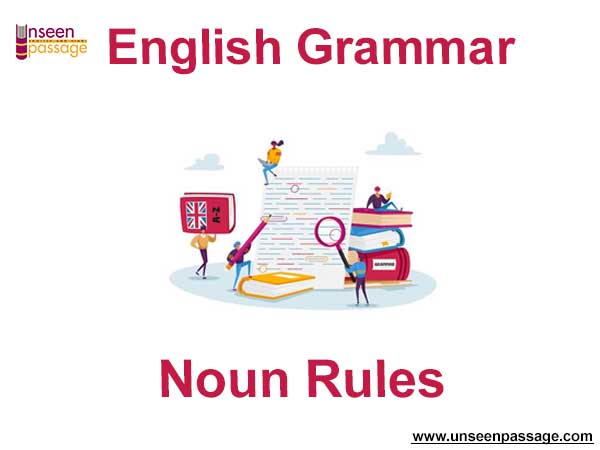Noun Rules English Grammar
Students should refer to the following Noun Rules of English Grammar. These rules have been designed by expert English teachers to help students appearing in English Exams in schools or competitive examinations. You should remember the following Noun Rules so that you can use them correctly and score good marks in examinations. You should refer to all Rules of English Grammar provided by us to strengthen your understanding.
Noun Rules
Rule 1- Some nouns always take a singular verb.
• Information, Scenery, Advice, machinery, stationery, furniture, abuse, fuel, rice, gram, issue, bedding, repair, news, mischief, poetry, business, economics, physics, mathematics, classic, ethics, athletics, innings, gallows.
(A) The scenery of haridwar is enchanting. (not ‘are’)
(A) He has given advice to me. (not ‘advices’)
Rule 2- Some nouns look singular, but they are used in plural form and always take a plural verb.
• Cattle, gentry, vermin, peasantry, artillery, people, clergy, company, police.
For eg-
(A) The cattle are grazing in the ground.
(B) Police have controlled the law and order situation.
Rule 3- Some nouns are always used in a plural form and always take a plural verb.
• Trousers, scissors, spectacles, stockings, shorts, measles, goods, alms, premises, thanks, tidings, annals, chattels, etc.
(A) Where are my shorts?
(B) Where are my spectacles?
Rule 4- There are some nouns that indicate length, measure, money, weight or number. When they are preceded by a numeral, they remain unchanged in form.
• Foot, meter, pair, score, dozen, head, year, hundred, thousand, million.
(A) It is a five year degree course. (not ‘years’)
(A) I have seven dozen of shoes. (not dozens)
Rule 5- Collective nouns such as jury, public, team, committee, government, audience, orchestra, company, etc. are used both as singular and Plural. It depends on the usage.
(A) The jury were divided in their opinion.( ‘was’ not used as jury members had diff. opinions and taken here individually)
(B) The team has not arrived yet. ( ‘Have’ not used as we are talking about team collectively)
Rule 6- Some nouns have one meaning in the singular and another in the plural:
a. Advice = counsel,
advices = information
b. Air = atmosphere,
airs = proud
c. Authority = command,
authorities = persons in power
d. Good = wise ,
goods = property
f. Force = strength
forces = army
g. Content = satisfaction,
contents = things contained
h. Respect = regards,
respects = compliments
i. Work = job
works = compositions, factories,.
Rule 7- People are often confused or they commit mistakes in the use of certain nouns.
(A) Lecturership is wrong: lectureship is correct.
(B) Freeship is wrong; free – studentship is correct.
(C) Boarding is wrong; boarding house is correct.
(D) Family members is wrong; members of the family is correct.
(E) English teacher is wrong; the teacher of English is correct.
(F) Cousin – brother or sister is wrong; only cousin is correct.
(G) Wages means punishments when used in the singular.
Ex- The wages of sin is death.
(H) It also means charges for the labour when used in the plural sense.
Ex- The wages of daily workers have been raised.
Rule 8- While using ‘everybody’ ‘everyone’, ‘anybody’, and ‘each’ the pronoun of the masculine or the feminine gender is used according to the context.
I shall be happy to help each of the boys in his practice.
But when the sex is not mentioned, we use the pronoun of the masculine gender.
• Anyone can become member if he tries.
Rule 9- A pronoun must agree with its antecedent in person, number and gender.
Ex- Every student must bring his pen.
All students must complete their project.
Rule 10 – The pronoun ‘one’ must be followed by ‘one’s’.
• One must finish his homework in time. (Incorrect)
• One must finish one’s homework in time. (Correct)
Rule 11- Resign, acquit, drive, Enjoy, exert, avail, pride, absent, etc., when used as transitive verbs, always take a reflexive pronoun after them. When ‘self’ is added to ‘my’, ‘your’, ‘him’, ‘her’, and ‘it’, and ‘selves’ to ‘our’ and ‘them’ – they are known as reflexive pronouns.
• He absented from the meeting.
• He absented himself from the meeting.
Rule 12- ‘Who’ denotes the subject and ‘whom’ is used for the object?
• who : It’s the subject of a verb—e.g., Who gave you that book?
Whom is an objective pronoun, which is a pronoun that receives the action of a verb. e.g., Whom should I meet?
Rule 13- When two or more singular nouns are connected by ‘either or’; ‘neither nor’, ; and ‘or’, the pronoun used is singular.
• Either Rohan or Sohan will give their bike. (Incorrect)
• Either Rohan or sohan will give his book. (Correct)
Rule 14- When a singular and a plural noun are joined by ‘or’, ‘nor’, the pronoun must be plural.
• Either the student or his teachers failed in his duty. (Incorrect)
• Either the student or his teachers failed in their duty. (Correct)
Rule 15- ‘Whose’ is used for living persons and ‘which’ for lifeless objects.
• Which book did you opt?
• Whose shirt is lying there?
Rule 16- ‘Each other’ is used when there are two subjects or objects and ‘one another’ when there are more than two.
• Ram and Sita loved each other.
• Those five students, who are sitting there, love one another.
Rule 17- When a pronoun is used for a collective noun; it must be in the singular form and in neutral gender (Here collective noun is viewed as a whole). But if it gives an idea of different parts/people which means it is not viewed as whole, plural pronoun is used.
• The jury gave ‘its’ verdict.
Here the ‘jury’ gives the idea of one whole.
If the collective noun conveys the idea of separate individuals comprising the whole, the pronoun used for it must be plural.
• The jury were divided in their opinions.
In this sentence, the ‘jury’ gives the idea of several individuals.
Rule 18 – If pronouns of different persons are to be used together in a sentence, the serial order of persons should be as follows; Second person(2) + Third (3)+ First person(1) in normal sentences. But when mistake or fault is expressed in the sentence, the order should be; first person(1) + second person(2) + third person(3). RULE-231
• You, he and I have finished the work. (Normal idea)
• I, you and he are to blame. ( here Confession of guilt is expressed , it’s a negative idea, hence order is 123)
Rule 19 – ‘Some’ is used in affirmative sentences to express quantity or degree. ‘Any’ is uses in negative or interrogative sentences.
• I shall buy some oranges.
• I shall not buy any oranges.
• Have you bought any apples?
But ‘some’ may be correctly used in interrogative sentences which are, in fact, requests.
• Will you please give me some water?
Rule 20 – Use of ‘less’ and ‘fewer’ ‘Less’ denote quantity and ‘fewer’ denote number.
• No less than sixty girls were selected. (Incorrect)
• No fewer than sixty girls were selected. (Correct)
• There is no fewer than five litres of water in the bottle. (Incorrect)
• There is no less than five litres of water in the bottle. (Correct)
Rule 21- Use of little, a little, the little ‘Little’ means ‘hardly any’. It gives kind of negative meaning. Foe eg-
• There is little hope of his recovery. (It means his recovery is not possible)
‘A little’ means ‘some’, though not much but still manageable. It gives positive meaning.
• I had a little milk in the morning.
‘The little means ‘not much but all there is’.
• Little water that is in the bottle may be used for the patient. (Incorrect)
• The little water that is in the bottle may be used for the patient. (Correct)
Rule 22- Use of elder, older.
‘Elder’ is used for persons of same family.
‘Older’ refers to persons (not related) as well as things and is followed by ‘than’.
• Sonu is elder than all other boys of this area. (Incorrect)
• Sonu is older than all other boys of this area. (Correct)
• Sabu is my older brother. (Incorrect)
• Sabu is my elder brother. (Correct)
Rule 23- Normally ‘than’ is used in the comparative degree, but with words like superior, inferior, senior, junior, prior, anterior, posterior and prefer ‘to’ is used.
For e.g.-
• Ranu is superior than Neena.( Incorrect)
• Ranu is Superior to Neena. (Correct)
• I prefer reading than walking. (Incorrect)
• I prefer reading to walking. (Correct)
Rule 24- when a comparison is made by using a comparative followed by ‘than’, the word ‘other’ must exclude the thing compared form the class of things with which it is compared.
• He is better than any man. (Incorrect)
• He is better than any other man. (Correct)
‘Any man’ includes the man himself and thus the sentences will be awkward.
‘Any other man’ is appropriate.
Rule 25- In some cases, the comparison is subtle and must be given proper attention.
• Ex- The climate of Delhi is better than Mumbai. (Incorrect)
Here the comparison should be between the climate of Delhi and the climate of Mumbai.
• The climate of Delhi is better than the climate of Mumbai. (Correct) Or
• The climate of Ranchi is better than that of Gaya. (Correct)
(Here, ‘That of’ means ‘the climate of’)
If the traits are in plural, it will be ‘those of’.
• The products of Honda are better than those of Nissan.
• The scenery of Kashmir is better than Shimla. (Incorrect)
• The scenery of Kashmir is better than that of Shimla. (Correct)
Rule 26- ‘many a’ is always followed by the singular verb.
• Many a student were drowned in the river. (Incorrect)
• Many a student was drowned in the river. (Correct)
Rule 27- If the subject is ‘the number of’ the singular verb is used. And when the expression (‘a+number+of) is used, plural verb is used.
• The number of footballers are very small. (Incorrect)
• The number of footballers is very small. (Correct)
• A number of boys has failed in the examination. (Incorrect)
• A number of boys have failed in the examination.(correct)
Rule 28- When ‘as well as’, ‘along with’, together with’, ‘no less than’, ‘in addition to’ and ‘not’ and ‘with’ join two subjects, the verb will be used according to the first subject.
• Sonu, as well as his three friends, are going for a picnic.( Incorrect)
• Sonu, as well as his three friends, is going for a picnic. (Correct)
• The teacher, along with the students, were going.(Incorrect)
• The teacher, along with the students, was going.(Correct)


